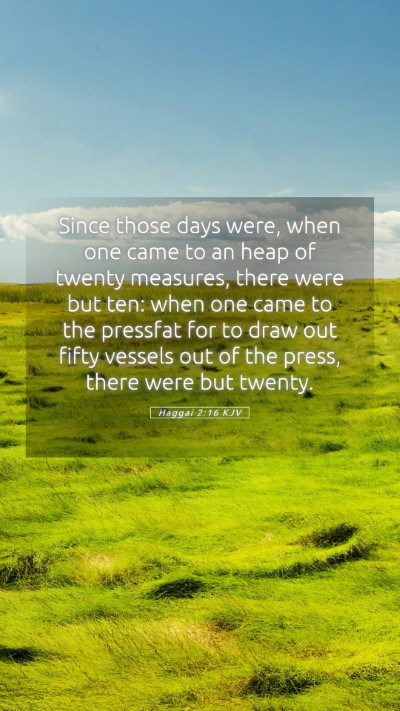Old Testament
Genesis Exodus Leviticus Numbers Deuteronomy Joshua Judges Ruth 1 Samuel 2 Samuel 1 Kings 2 Kings 1 Chronicles 2 Chronicles Ezra Nehemiah Esther Job Psalms Proverbs Ecclesiastes Song of Solomon Isaiah Jeremiah Lamentations Ezekiel Daniel Hosea Joel Amos Obadiah Jonah Micah Nahum Habakkuk Zephaniah Haggai Zechariah MalachiHaggai 2:16 Meaning
What is the meaning of Haggai 2:16?
Since those days were, when one came to an heap of twenty measures, there were but ten: when one came to the pressfat for to draw out fifty vessels out of the press, there were but twenty.
Haggai 2:16 Bible Verse Meaning
Bible Verse Meaning of Haggai 2:16
Haggai 2:16 reads, “Since those days were, when one came to a heap of twenty measures, there were but ten: when one came to the pressfat for to draw out fifty vessels out of the press, there were but twenty.” This verse reflects a period of scarcity and disappointment among the people of Israel. The verse is addressing the economic and spiritual condition of the people after their return from exile, emphasizing the futility of their efforts amid divine disfavor.
Commentary Insights
This verse is critical for understanding the broader context of the Book of Haggai and the challenges faced by the returned exiles.
-
Matthew Henry's Commentary:
Matthew Henry highlights the state of disillusionment among the Israelites. The verse indicates a time of great disappointment where efforts to gather crops yielded minimal returns. God's judgment was upon them for their neglect of the temple, serving as a reminder that true prosperity comes through obedience to His commands.
-
Albert Barnes' Notes:
Barnes notes that Haggai's prophetic message conveyed the idea that the diminished harvests and measures served as a divine lesson. The measurements mentioned are symbolic of their lack of blessings due to their disobedience. The returnees needed divine favor and rebuilding the temple was crucial for their restoration.
-
Adam Clarke's Commentary:
Adam Clarke emphasizes the historical context and socio-economic implications of the verse. He suggests that such low yields represent a broader spiritual malaise within the community. Clarke points out that there was a direct correlation between their neglect of God’s house and their present struggles.
Thematic Analysis
The themes of divine chastisement and restoration pervade Haggai 2:16. The verse can be understood within the following contexts:
-
Divine Judgment:
The diminished returns indicate God’s displeasure with Israel's priorities, emphasizing that neglecting spiritual responsibilities can lead to material hardships.
-
Call to Action:
This serves as a motivational reminder for Israel to prioritize the rebuilding of the temple, which signifies their renewed relationship with God.
-
Hope in Restoration:
Despite the bleak outlook, this message carries an underlying hope—that spiritual restoration will lead to physical blessings. God desires His people to turn back to Him.
Application of Haggai 2:16
Understanding this verse provides valuable insights for contemporary believers:
- Self-Reflection: Individuals are encouraged to evaluate their own priorities in light of their relationship with God.
- Community Engagement: Believers might consider how neglecting communal worship or outreach can result in collective hardship.
- Faith and Works: The necessity of aligning both faith and action is stressed, underscoring that genuine faith is demonstrated through obedience and diligent service.
Cross References
Haggai 2:16 can be related to the following passages:
- Joel 1:10: Discusses agricultural devastation and the call for repentance.
- Deuteronomy 28:38: Highlights the consequences of disobedience, including failed harvests.
- Zechariah 8:12: Promises restoration and blessings upon the people once they return to God.
Conclusion
Haggai 2:16 is a poignant reminder of the relationship between spiritual priorities and tangible outcomes. The succinct nature of this verse, combined with the insights from classic commentaries, reveals a deeper understanding of life's challenges as reflections of one's standing before God. As we seek to derive meaning from Bible verses, engaging deeply with scripture enhances our overall Bible study insights and equips believers to apply these teachings in their lives.
This verse, like others in the Bible, holds a wealth of commentary and interpretation resources which can aid in understanding scripture deeply, fostering a more enriched biblical experience.


